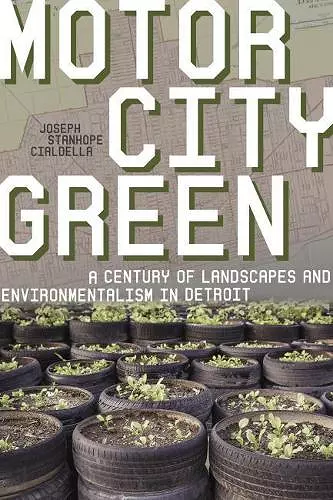Motor City Green
A Century of Landscapes and Environmentalism in Detroit
Joseph Stanhope Cialdella author
Format:Hardback
Publisher:University of Pittsburgh Press
Published:3rd Mar '20
Currently unavailable, our supplier has not provided us a restock date

Motor City Green is a history of green spaces in metropolitan Detroit from the late nineteenth- to early twenty-first century. The book focuses primarily on the history of gardens and parks in the city of Detroit and its suburbs in southeast Michigan. Cialdella argues Detroit residents used green space to address problems created by the city’s industrial rise and decline, and racial segregation and economic inequality. As the city’s social landscape became increasingly uncontrollable, Detroiters turned to parks, gardens, yards, and other outdoor spaces to relieve the negative social and environmental consequences of industrial capitalism. Motor City Green looks to the past to demonstrate how today’s urban gardens in Detroit evolved from, but are also distinct from, other urban gardens and green spaces in the city’s past.
Motor City Greenputs the city’s current moment in a larger context by showing that urban gardening has a long history in Detroit. Artfully drawing connections between rusty industrial spaces with lush urban green spaces, Cialdella shows readers how the two are inherently related rather than opposed." —Catherine McNeur, Portland State University
"Motor City Green is the most comprehensive published history of parks or urban agriculture in Detroit. Since the historiography of urban agriculture remains relatively underdeveloped, Cialdella's book should attract more attention to the topic within the fields of urban history and urban environmental history." —Josiah Rector, Northland College
"Projects to green cities strike many as new and innovative. In this excellent book, Joseph Cialdella challenges this assumption by showing that urban environmentalism in Detroit has a long and fascinating history. Immigrant, working-class, and African-American Detroiters used nature to grow food, play, ameliorate a harsh industrial setting, build community, and reimagine urban life." —Colin Fisher, University of San Diego
ISBN: 9780822945727
Dimensions: unknown
Weight: unknown
246 pages